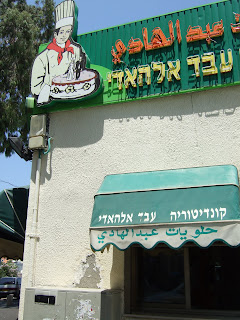Israel is a young country, full of contradictions, competitiveness, and color. It's the stony deserts of the Negev and the classy streets of Tel Aviv. It's the mosque within sight of Matam, the scientific and technological center of Haifa. It's the tent city student protest parties and the train full of tired youth returning from the military for Shabbat. It's the warm kiss from a friend and the smile of a stranger baking pitas. Haertz Israel. The land and the people.
A parting story:
Yesterday was the best day we've had during our entire time here. We started the morning with fresh pastries and chocolate cereal. We said goodbye to Camel (our car) and Avi our landlord. Avi has a son in San Jose so we chatted about California, Yosemite, and Tahoe. He is off to Barcelona in a few weeks.
We walked the beach to the train station and went to see downtown Haifa for the last time. We had been here before, in February, when it was cold enough to scale the 1002 steps from Yefe Nof to Wadi Nisnas in sweatshirts. On a gray and rainy day we had wandered down into Wadi Nisnas and discovered an amazing baklava bakery in the midst of a very strange part of town. We had wandered around the old city and back up the mountain tasting the first flavors of Israel--foreign, exciting and a little scary--as we made our way back up to the Carmel Center.
Full circle, back in Wadi Nisnas nothing looked familiar. The sun was shining, unmercifully hot, and the little ramshackle village didn't look half as "Middle Eastern" as it had on that gray day in February. The people were welcoming and warm. To think that I had once considered them slightly threatening! We went back to the same bakery where we met some very kind Jewish women. They were there to purchase merengue cookies but heartily recommended different types of baklava and helped us communicate with the shop owner. The bakery, located in a Christian Arab village, caters to his neighbors. For the Jewish ones, he has a sign in Hebrew letters and bakes cakes and cookies in the European fashion. For the Arab ones, he has a sign in Arabic and bakes baklava and knefe sprinkled with rose water. Everyone is free to indulge in their own comfort food.
Later in the evening, we went for a sunset swim. Since jellyfish season is now over, the beach was massively crowded. There were people everywhere--on the sand and in the water. We swam out and looked back on the crowd. It was the world's largest pool party! There were kids jumping off of their dads' shoulders, Russian women floating around as they gossiped and single men trying to swim aggressively against the waves. Everyone was happy. How could you not be? The water and the gentle waves were like a warm hug, relaxing as it cradled you and rocked you back and forth. There were no jellyfish, nothing to be afraid of, just sand and water and laughter. This was the Israel I didn't expect and the one that I'll cherish for as long as I live.
"Shalom," meaning "peace" is the traditional greeting in Israel. It is also "good-bye." So go in peace, live in peace, come again in peace.
I used to wonder what the waves whispered as they sighed outside my window. Now, I know.
Shhhhhhhhalom.













